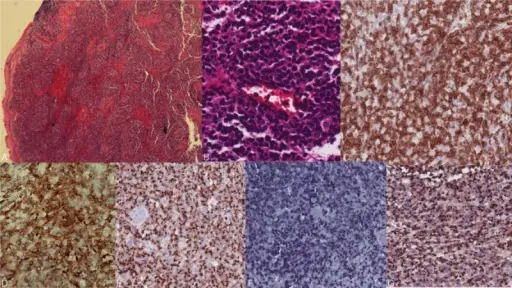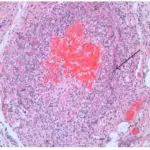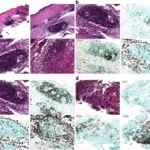Extranodal T/NK-Cell Lymphoma is a form of non-Hodgkin lymphoma (NHL) which are most of B-cell origin.
What is the Pathology of Extranodal T/NK-Cell Lymphoma?
The pathology of extranodal T/NK-Cell lymphoma is:
-Etiology: The cause of extranodal T/NK-Cell lymphoma is as follow: Acquired immunodeficiency ailments, Inherited immunodeficiencies, autoimmune ailment, association with infectious agents (EBV), and chemical or drug exposures (radiation).
-Genes involved: Unknown.
-Pathogenesis: The sequence of events that lead to extranodal T/NK-Cell lymphoma; Nasal NKTCLs are mostly linked with Epstein-Barr virus (EBV), regardless of the background of the affected population. The precise mechanism of malignant conversion via EBV is not yet clearly clarified.
-Histology: The histology associated with extranodal T/NK-Cell lymphoma shows the presence of a broad cytologic spectrum. Diffuse infiltration of both pleomorphic small and large lymphoma cells, assorted with several inflammatory cells on the necrotic contextual. Cells are with, small nucleoli, pale-to-clear cytoplasm, granular chromatin, and irregular nuclei.
How does Extranodal T/NK-Cell Lymphoma Present?
Patients with extranodal T/NK-Cell lymphoma typically male are more frequently affected with the ailment than females, with a ratio of 3:1. present at age range of the sixth decade. The symptoms, features, and clinical findings associated with extranodal T/NK-Cell lymphoma include: night sweats, weight loss, bone pain, fever, fatigue, facial agony, decreased visual acuity, purulent nasal discharge, orbital swelling, nasal obstruction, refractory sinusitis, nasal septal perforation among others.
How Extranodal T/NK-Cell Lymphoma Diagnosed?
Extranodal T/NK-cell lymphoma is diagnosed thorough medical history and physical exam. Laboratory studies include, liver function tests, complete blood count (CBC), uric acid and calcium levels, renal function tests and Epstein-Barr virus (EBV) titers test. Imaging studies include CT scan and MRI other include nasopharyngoscopy and biopsy.
How is Extranodal T/NK-Cell Lymphoma Treated?
Extranodal T/NK-cell lymphoma is treated Medical care chemotherapy based on tumor cell growth; Antineoplastic agents, Vincristine, Doxorubicin Cyclophosphamide, and Prednisone. Surgical intervention is limited to biopsy, debulking of disease, and the need to stabilization the airway.
What is the Prognosis of Extranodal T/NK-Cell Lymphoma?
The prognosis of extranodal T/NK-cell lymphoma is poor. Multidrug resistance phenotype contributes to low survival rates, low rates of rejoinder to management are secondary to CD56 cell marker.



